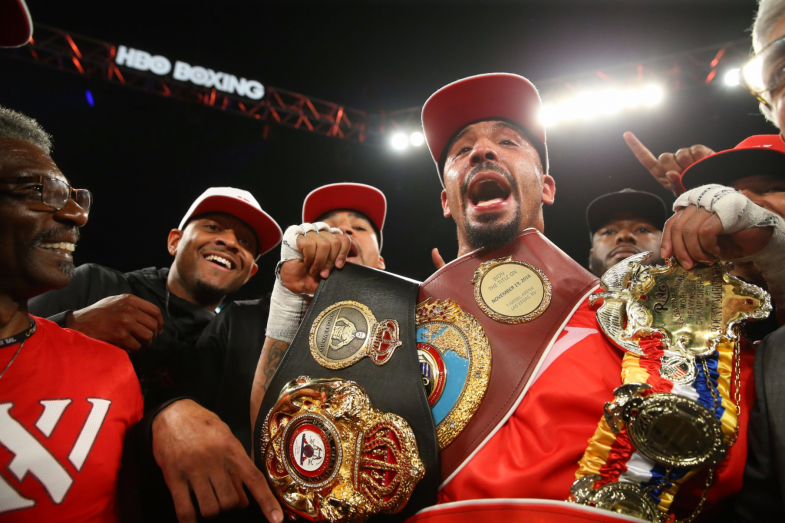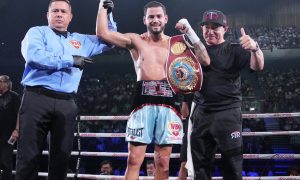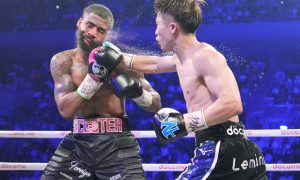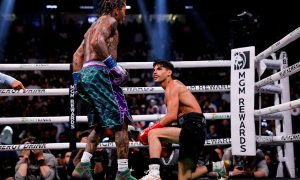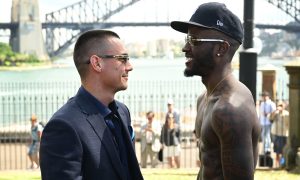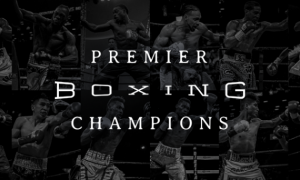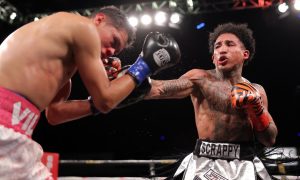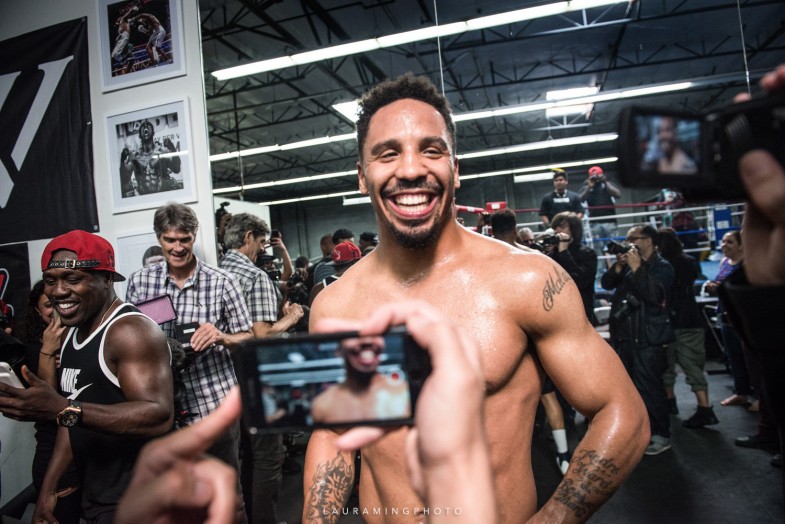
Photo by Laura Ming Wong/RBRBoxing
Retirement from boxing is as contentious as assisted suicide. Some agree with the decision, some think a fighter can hold on a little longer, some are indifferent. We mourn, agree to disagree, and move on.
To compare putting down the gloves with euthanasia seems dark, extreme, even morbid.
But in a sport where blood is a currency of respect—at best, the least of your sacrifices—and where death has and continues to be a likely possibility, it’s not that radical of an analogy.
I feel weird alluding to a sport I love and center my life’s work on as being akin to a terminal illness, but for professional fighters I understand how this can be.
Ward graciously thanked his supporters, and stated clearly that the rigors of the sport were no longer for him, leaving no desire to continue fighting.
Professional fighting can easily take its toll on a person, and not just in terms of wear and tear on the body or the commitment of mental energy required to keep yourself going.
Boxing’s culture is fatiguing. Being a professional fighter means being governed by a system of chaos, filled with a myriad of issues: finding the right coaches, dealing with promoters, waiting for fights to be made, handling negotiations in stalemate, overcoming injuries, and tending to fans that are never satisfied.
Andre Ward formally announced his retirement with a video on Instagram and a short address on his website titled “Mission Accomplished.” He had three goals in the sport: to be a fighter, to be an Olympic champion, and to become world champion.
He did all of these things.
If you filter through the comments and articles covering his retirement there’s a surprisingly clear consensus that this is a thoughtful decision, with lots of well wishes, praise and acknowledgment that he’s the GOAT (greatest of all time).
Ward is a total package. Besides being an excellent athlete, his mainstream appeal, persona, family values and how he conducts himself outside the ring are what sports marketing dreams are made of.
With Ward there was little controversy besides what went on in the ring (which should be the standard, but for a sport that protects and gladly profits off domestic abusers, it’s a rare find).
Yet for an undefeated champion, he could never seem to win with the bulk of boxing fans.
The positive response is only surprising because Ward has always been fairly polarizing. Your perception of him depends on what school of boxing you come from. Boxing purists have always known he’s one of the greats; casual and thrill-seeking fans are quick to call his style “boring.”
I don’t agree, but I also don’t get angry with fans who think this way anymore.
Boxing is as complex and beautiful as it is ambiguous, and I accept that it’s been difficult for it to metamorphose into a sport of orderly tactics, when brutality and legitimacy make up its origins.
We’re far from the days of bareknuckle boxing, but there’s still such discord over what exactly boxing is. The lack of apparent objective is what makes judging and scoring fights so difficult, and why no one can agree what made a fight “good” or not.
Boxing is the only sport I know of where at the end of a match, people disagree on who won. No one disagrees that the Patriots won the Super Bowl last season. You may disagree with the strategy or some bogus calls, but no one disputes who won.
Judging in boxing sucks, but how do we judge tactics when we don’t know the objective? How do we judge fighters when we don’t know what exactly it is they’re fighting for?
We’re still going off of legitimacy—opinion, with the weight of concrete law—to measure who won and who’s the greatest in the sport.
The usual criteria of legitimacy is strength, power, machismo and an alpha male-like dominance. It’s also criteria of a fragile male ego that quite frankly, is tiresome.
A few years ago, I wrote about Ward’s drama with his late promoter, Dan Goosen, and how his treatment by the boxing community at large spoke to the sport’s less than admirable politics.
I’m still perplexed by how boxing is one of the only major sports where an athlete can be exceptional at what he does and not be regarded as the cream of the crop.
The truth is, we don’t deserve Andre Ward.
When I say we don’t deserve Ward, what I’m really saying is that we as the boxing community—fans, promoters, even other fighters—are undeserving of great fighters.
We’re a culture of critics, always seeming to know exactly what fighters should or shouldn’t do. Boxing fans love the hypotheticals, often citing what “they” would have done in a fight, though most haven’t boxed a day in their life. And their loyalty can waiver over one crappy performance.
We’re a culture of greed, looking to prioritize what gratifies us the most over what serves the common good. Promoters fail to strike a balance between running a successful business and looking out for their client’s best interests.
Because if there’s one thing boxing has in common with other major sports, fighters aren’t clients, they’re cattle.
We’re a culture of ego. Fighters would rather wait years to face other great fighters if it means keeping an unblemished record, and enjoying accolades they don’t deserve.
More than anything we’re a culture of complacency. We love to complain about the judges and decisions we hate, the styles we can’t stand, and every other gripe that comes to mind. Yet, nothing ever changes.
There’s little-to-no reform by the people at the top of boxing, who could really make a difference, because they benefit too much from it. The rest of us who care deeply about the sport’s integrity feel powerless in creating any sort of change.
So boxing, as an art, feels a lot like someone that’s already great, but they’re suffering by hanging out with the wrong crowd.
Though Ward has been slighted in some ways, he’s also made significant contributions to the sport, and I believe he’ll continue to be active in it even as a non-fighter.
People always say that some fighters just don’t know when to hang it up, and so it’s meaningful that Ward was able to define success in boxing for himself and accomplish those things.
My hope is that Ward’s retirement, which is the loss of an under-appreciated fighter, sparks a series of conversations and actions to improve boxing for those who so graciously sacrifice their lives and bodies for our entertainment.
Header photo by Ed Mulholland/HBO





